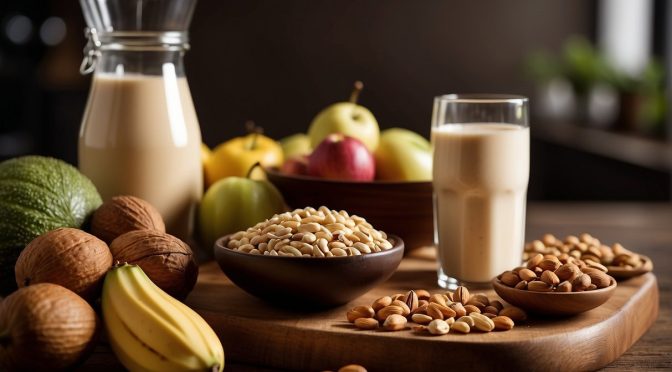Including the right healthy snacks for muscle gain can give you an added advantage to achieving your fitness goals. When you’re working to build muscle, it’s crucial to provide your body with the necessary fuel. This will help power through workouts and recover properly. Snacks rich in protein are beneficial. Protein is the key macronutrient responsible for repairing and building muscle tissue. Choosing snacks that are high in protein and nutritious supports your muscles and overall health.
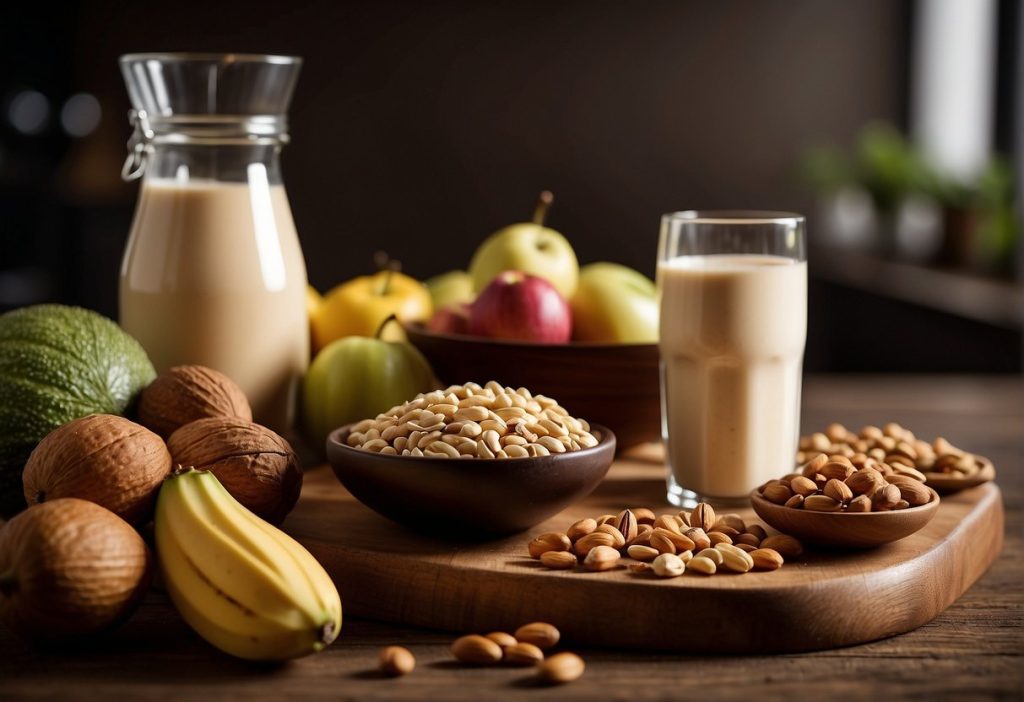
Selecting the appropriate snacks can be simple and delicious. Greek yogurt is a great example of a protein-packed option. It can help meet your daily grams of protein requirements. Protein bars and shakes offer convenience without compromising nutrition. They are a practical option for busy lifestyles. Hard-boiled eggs are a versatile whole food alternative. You can enjoy them on their own or as part of a meal. Strategic snacking isn’t just about what you eat; it’s also about when you eat. Consuming protein-rich snacks after a workout can aid in effective muscle recovery.
Key Takeaways
- High-protein, nutritious snacks are essential for muscle gain.
- Convenience and nutrition can coexist with snacks like Greek yogurt and protein bars.
- Timing your protein snack intake can optimize muscle recovery.
Importance of Protein in Muscle Gain
Protein is a critical nutrient for muscle gain. Your muscles need protein to repair and rebuild after resistance training. During exercise, muscle fibers experience microscopic damage. Protein repairs this damage. It also facilitates muscle growth by providing the essential amino acids.
To effectively build muscle mass, incorporating a sufficient amount of protein into your diet is essential. The recommended dietary allowance (RDA) for protein is 0.8 grams per kilogram of body weight. If you’re looking to gain muscle, you should increase this amount. Aim for approximately 1.6 to 2.2 grams of protein per kilogram of body weight, especially if you’re engaging in regular strength training.
Consuming high-quality protein sources is crucial for maximum muscle gain. These include:
- Lean meats: chicken, turkey, and lean beef cuts
- Fish: salmon, tuna, and cod
- Dairy: milk, yogurt, and cheese
- Plant-based: tofu, legumes, and quinoa
Each source provides a different profile of essential amino acids, which are the building blocks of protein. You must ingest these amino acids through your diet because your body cannot produce them.
In summary, your intake of quality protein directly supports your ability to gain muscle and achieve lean muscle mass. This happens when combined with effective resistance training. Adjust your protein intake according to your physical demand. Make sure you vary your sources to cover the spectrum of essential amino acids for optimal muscle health.
Greek Yogurt: A Protein-Packed Snack Option
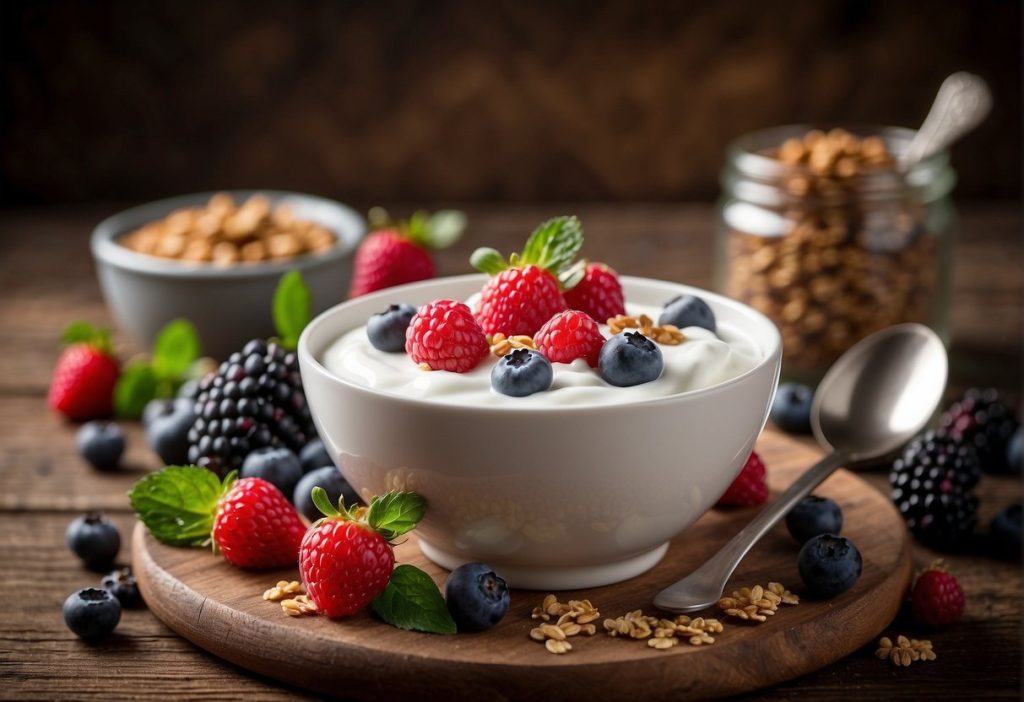
Greek yogurt stands out as a superior snack for muscle gain due to its high protein content and health benefits.
Benefits of Greek Yogurt
Greek yogurt is a nutritious snack that supports your muscle-building goals. It also provides extra health benefits. It’s a rich source of probiotics, which are beneficial bacteria that help maintain a healthy digestive system. This dairy product is also packed with calcium, essential for bone health. Moreover, Greek yogurt can contribute to heart health. It can manage blood pressure and heart disease risks. This is thanks to its potential role.
- Probiotics: Support digestive health
- Calcium: Strengthens bones
- Heart Health: May aid in maintaining a healthy heart
High Protein Content in Greek Yogurt
When you’re focusing on muscle gain, protein is pivotal, and Greek yogurt is an excellent source. A typical 200-gram serving of non-fat Greek yogurt can offer around 17 to 20 grams of protein. This is much higher compared to regular yogurt, assisting in the repair and growth of muscle tissues post-workout.
| Serving Size | Protein |
|---|---|
| 100 g | 9-10 g |
| 200 g | 17-20 g |
Comparison With Regular Yogurt
While both Greek yogurt and regular yogurt are dairy products, Greek yogurt is more concentrated in nutrients. The process strains it multiple times to remove whey. This results in a thicker consistency and a higher concentration of protein. Greek yogurt generally has fewer calories and fat than regular yogurt. This makes it a healthier choice for your fitness-oriented snack needs.
- Calories: Typically lower in Greek yogurt
- Fat: Less fat content compared to regular yogurt
- Protein: Significantly greater amounts in Greek yogurt
Protein Bars: Convenient and Nutritious Snacks
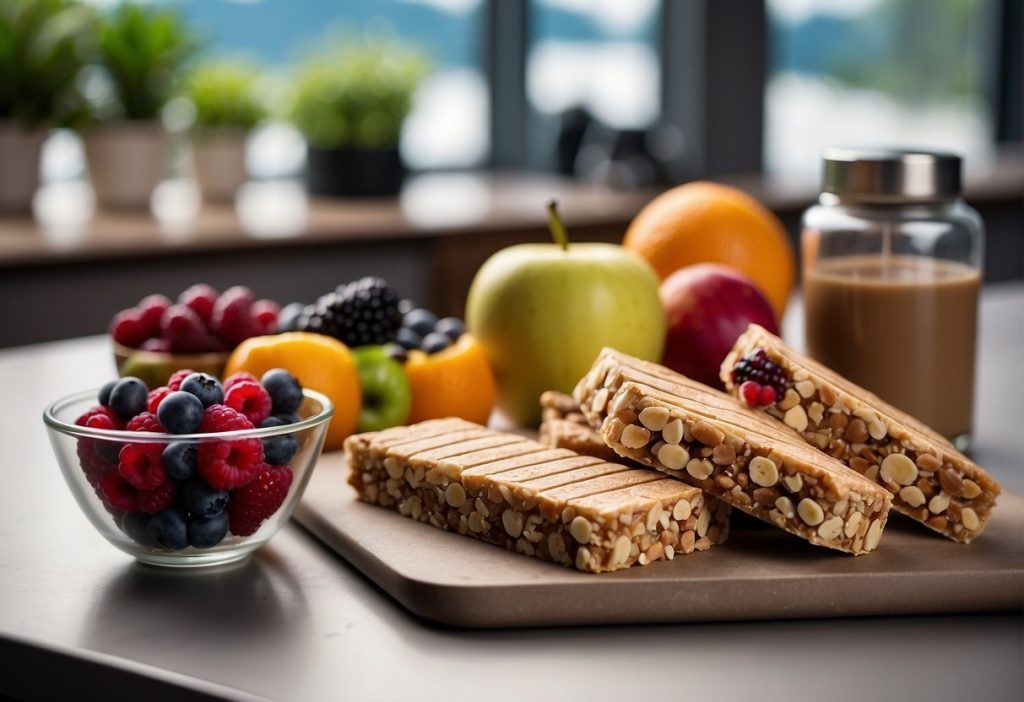
When you’re looking to support muscle gain, protein bars can be an efficient way to increase your daily protein intake. These portable snacks can provide a significant protein boost in a compact form, making them ideal for your busy lifestyle.
Protein Bars as a Quick Source of Protein
Protein bars are typically designed to deliver a substantial amount of protein — often between 10 to 30 grams of protein per serving. This macronutrient is essential for muscle repair and growth. It makes these bars a practical choice post-workout or as a filling snack.
| Nutrient | Benefit |
|---|---|
| Protein | Promotes muscle synthesis and recovery |
| Fiber | Supports digestion and can enhance satiety |
| Healthy Fats | Provides sustained energy |
Different Flavors and Varieties Available
Protein bars come in a wide array of flavors to suit your taste, from chocolate and vanilla to fruit and nut-based varieties. Looking beyond taste, it’s important to check the label for protein sources, which can vary from whey, soy, pea, or rice protein.
- Common Protein Sources in Bars:
- Whey
- Soy
- Pea
- Rice
Considerations When Choosing Protein Bars
When selecting a protein bar, inspect the label for other nutritional components:
- Calories: Appropriate for your dietary needs.
- Sugar: Opt for bars with low added sugars.
- Fiber: Seek bars with a good amount of fiber to enhance fullness.
- Healthy fats: Bars should contain nutritious fats, like those from nuts or seeds.
Protein Shakes: An Easy Way to Boost Protein Intake
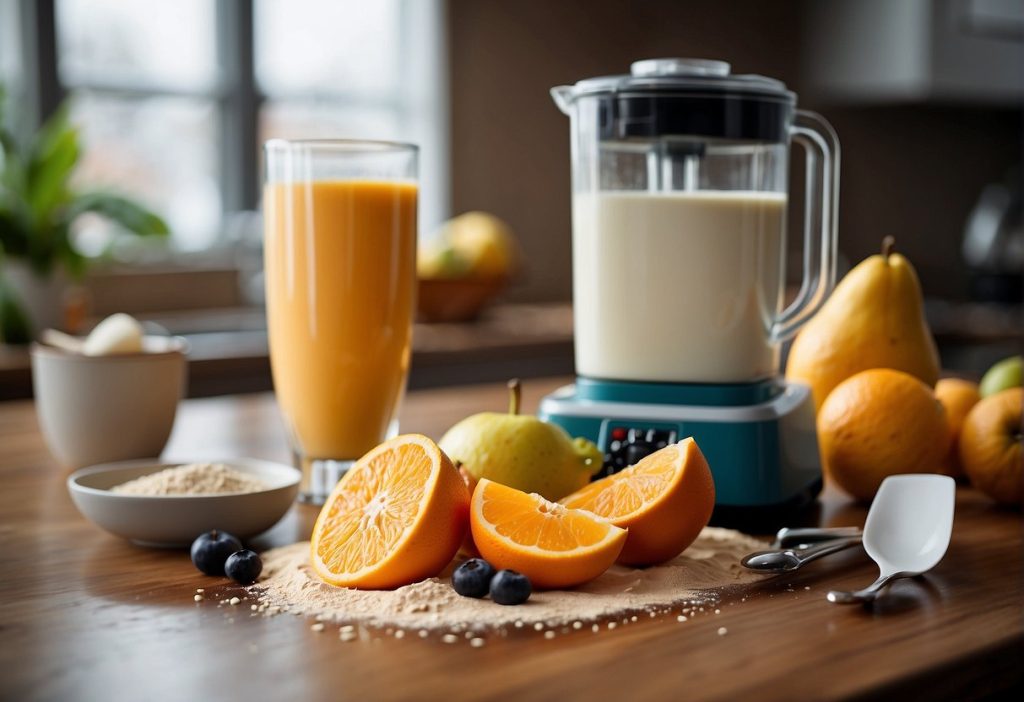
Protein shakes are a convenient and efficient way to increase your daily protein consumption. Protein is essential for muscle gain and recovery.
Benefits of Protein Shakes for Muscle Gain
Protein shakes provide a quick and concentrated source of protein. This is pivotal for muscle repair and growth after your workouts. The protein in these shakes aids in rebuilding the muscle fibers damaged during exercise. It also enhances muscle recovery. By supplying your body with the necessary protein, you’re better able to see gains from your strength-training efforts.
Different Types of Protein Shakes Available
- Whey Protein: Quickly absorbed, whey is an ideal post-workout snack for immediate muscle repair.
- Casein: This slow-releasing protein is perfect for consuming before bed, aiding in muscle recovery as you sleep.
- Plant-Based Protein: Soy, pea, and hemp protein are great options for those who do not consume dairy or have specific dietary preferences.
Each type provides a different rate of absorption and digestion. You can tailor your grams of protein intake to your specific fitness goals and dietary needs.
Homemade Vs. Store-Bought Protein Shakes
Homemade Protein Shakes:
- Customization: Tailor the ingredients to your personal taste and nutritional needs.
- Calories Control: You can manage the calorie content more precisely to fit your diet.
| Ingredients | Protein Source | Base |
|---|---|---|
| Fruits, nuts, seeds | Whey, casein, or plant-based protein | Milk or water |
Store-Bought Protein Shakes:
- Convenience: They’re ready to drink, with no preparation time needed.
- Consistency: Offers a consistent macronutrient profile in every serving.
You can buy protein shakes at the store for convenience. Or, you can make your own shakes for a personalized option. Adding protein shakes to your diet can help you gain muscle.
Hard-Boiled Eggs: A Versatile and Protein-Rich Snack
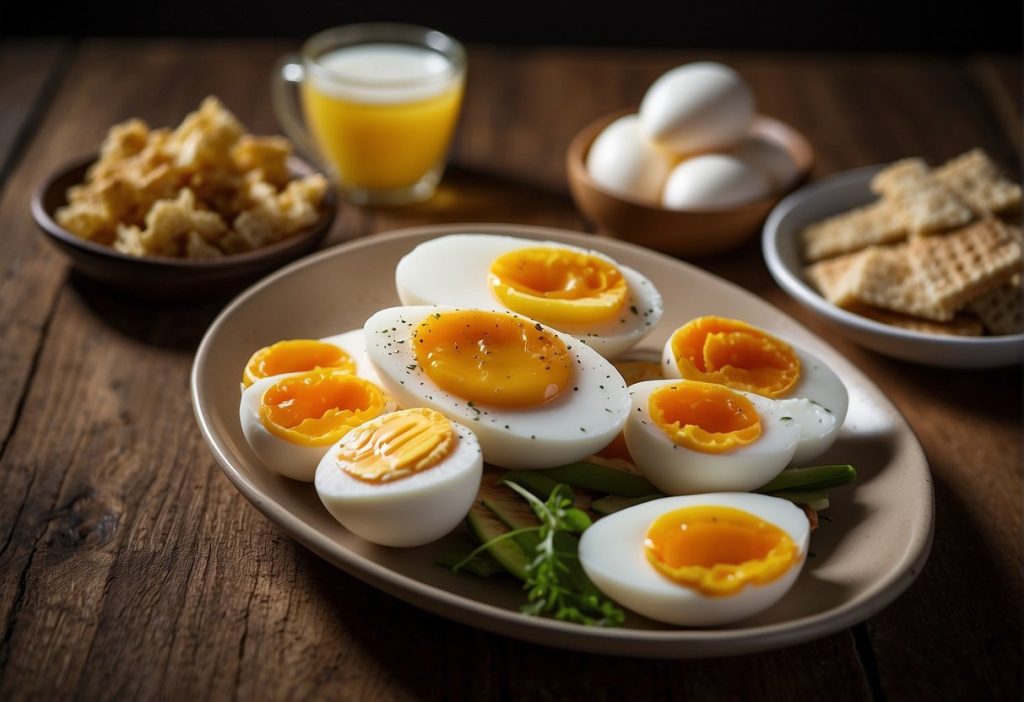
Hard-boiled eggs are an excellent and convenient snack for those aiming to build muscle due to their high protein content. A single hard-boiled egg contains about 6 grams of high-quality protein, which is vital for muscle repair and growth. Eggs contain complete proteins. They have all nine essential amino acids your body needs for nutrition.
Hard-boiled eggs provide a significant protein boost. They’re also packed with essential vitamins and minerals. These include Vitamin B12, critical for energy production, and Vitamin D, which plays a key role in bone health. Additionally, you will benefit from a supply of iron, zinc, and selenium, all minerals that support overall body function and muscle health.
Choline is an important nutrient found in eggs. It supports brain health. It is also crucial for athletes. It impacts muscle control and movement. With about 147 milligrams of choline per egg, they’re one of the best dietary sources available.
Here is how you can incorporate hard-boiled eggs into your diet:
- As a standalone snack, conveniently portable for post-workout recovery
- Sliced on top of a salad for a protein increase
- Included in meal prep for a quick protein source alongside complex carbs
They can season them in various ways, which also contributes to their versatility. Sprinkle with a little salt and pepper. Get creative with spices like paprika or turmeric. This can enhance flavor without adding many calories. Be mindful not to over-consume, as eggs are also a source of dietary cholesterol. However, they can be a healthy part of your diet when eaten in moderation and in conjunction with other nutrient-rich foods.
Nutrient-Rich Snack Options for Muscle Growth
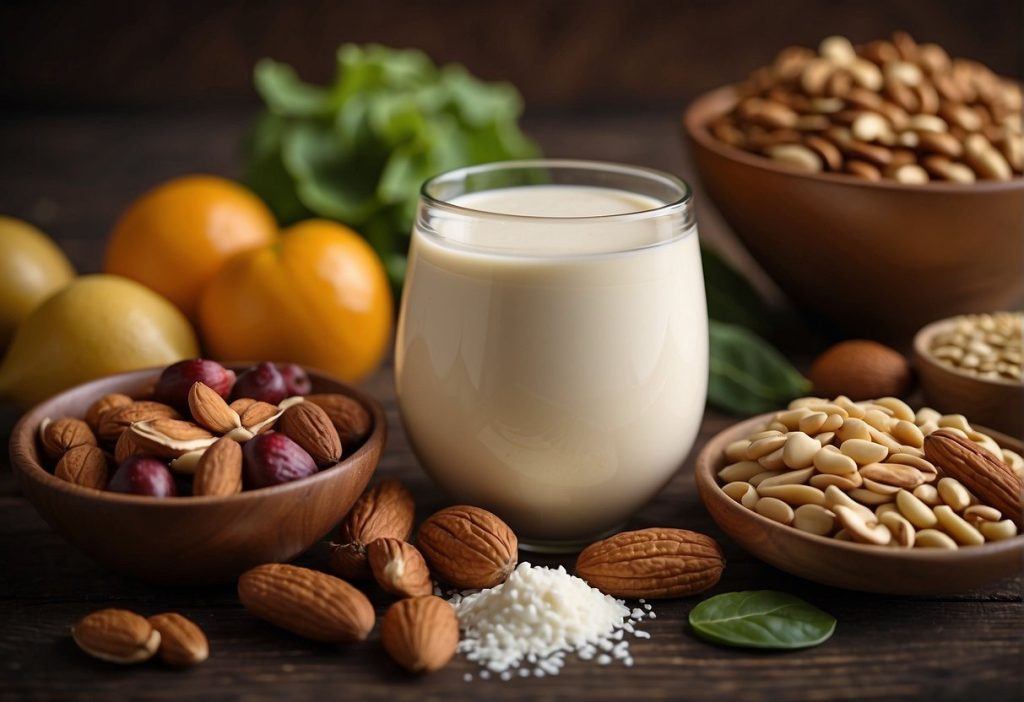
For effective muscle gain, high-protein snacks, healthy fats, and fiber are key. They support muscle repair and growth, while also providing sustained energy.
Nuts and Seeds
Nuts like almonds and seeds such as pumpkin seeds pack a nutritious punch. Rich in healthy fats, high-quality protein, and fiber, they help in muscle recovery and growth.
- Almonds: A handful provides 6 grams of protein and a substantial dose of energy-sustaining fats.
- Pumpkin Seeds: These are not only high in protein but also magnesium, which assists muscle function.
Edamame and Legumes
Legumes, including beans and edamame, offer a plant-based protein boost and are fiber-rich. Edamame is also a good source of calcium.
- Edamame: Easy to prepare, offering 17 grams of protein per cup.
- Beans: Versatile in dishes, beans add both protein and fiber, aiding digestion and muscle repair.
Dairy-Based Snacks
Dairy snacks like low-fat cottage cheese are excellent for muscle growth. This is because they contain high-quality protein and calcium.
- Low-Fat Cottage Cheese: With 28 grams of protein per cup, it’s very effective for muscle repair.
- Calcium: This mineral is vital for strong bones, supporting your muscular framework.
Strategic Snacking for Effective Muscle Recovery
When aiming for muscle gain, your snack choices can significantly impact your recovery. Protein-rich snacks provide the essential amino acids necessary for muscle repair and growth. They are a cornerstone of recovery strategies for any athlete.
Protein: To facilitate muscle recovery, aim for convenient snacks that are high in protein. A target range is 10 to 20 grams of protein post-exercise to aid in the repair of muscle fibers.
Healthy Snacks for muscle gain:
- Greek Yogurt: An excellent source of protein and calcium, which are vital for muscle health.
- Cottage Cheese with Fruits: Combines protein with quick-digesting healthy carbs to replenish energy stores.
- Protein Bars: Choose bars with a high protein-to-blood sugar level ratio.
Essential Nutrients: Your muscles also need more than just protein. Incorporating snacks that provide a good mix of fats, carbohydrates, and micronutrients is crucial.
- Nuts and Seeds: Almonds, chia seeds, and flaxseeds are powerhouses of omega-3 fatty acids and fiber.
- Whole Grain Toast with Avocado: Offers a balance of healthy carbs, healthy fats, and fiber.
For Athletes:
| Snack Option | Benefits |
|---|---|
| Protein Pancakes | High in protein, promote satiety and muscle repair. |
| Hard-Boiled Eggs | Portable, complete protein source. |
| Tuna on Whole Grain Crackers | Lean protein, aids in reducing muscle soreness. |
When selecting snacks for muscle gain and recovery, opt for whole food options over processed choices. The timing of your intake is also key. Consume protein within a 30-minute to two-hour window after your workout. This maximizes muscle protein synthesis. Stay hydrated, as adequate fluid intake is essential for optimal muscle function.
The Role of Whole Foods in a Protein-Rich Diet
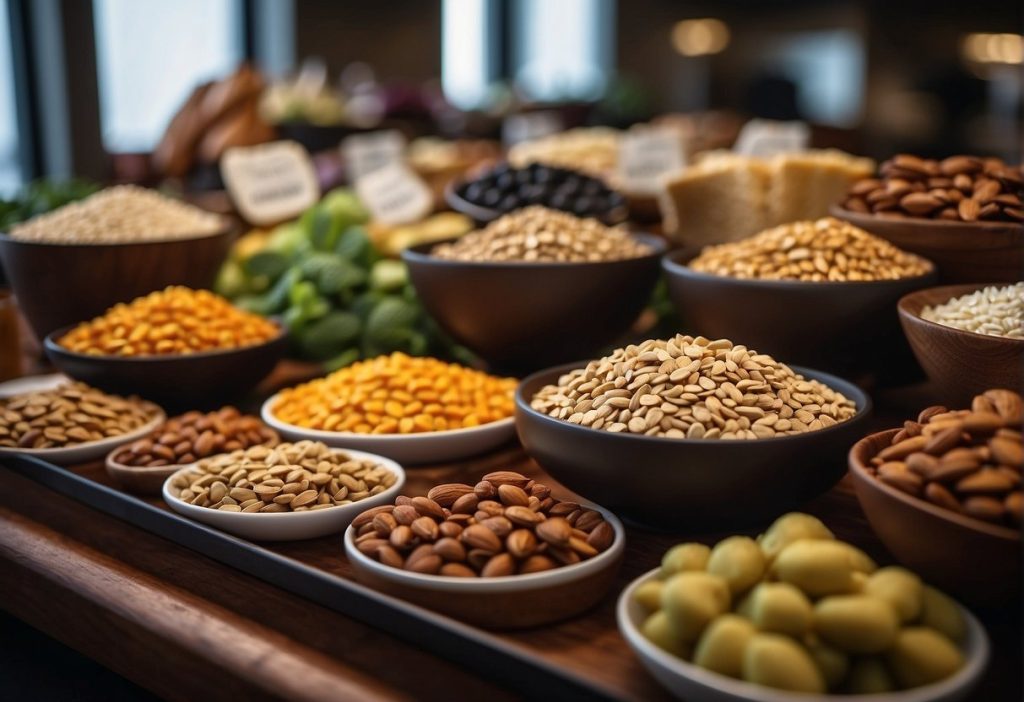
Incorporating whole foods into your diet is fundamental for muscle gain. They provide quality protein and other essential nutrients that support muscle repair and growth.
Benefits of Including Whole Foods
Whole foods are minimally processed and closer to their natural state. They provide a more complete nutritional profile than processed foods. Include these in your protein-rich diet. They contain many vitamins, minerals, and fiber. These nutrients are essential for overall health. They also help you digest and absorb protein. They help meet your nutritional needs. Processed alternatives contain added sugar content, fats, and preservatives.
- Higher Nutritional Value: Whole foods provide essential micronutrients that support muscle health and recovery.
- Natural Source of Protein: They deliver protein in a more natural form which may enhance absorption.
- Promotes Satiety: High-fiber content in whole foods helps keep you full, supporting weight management.
Examples of Protein-Rich Whole Foods
A variety of whole foods can help you meet your protein objectives. Here are some specific examples that pack a protein punch:
- Chicken: You can grill, bake, or sauté a lean source of protein.
- Beef: Rich in protein and iron, select lean cuts of beef for optimal nutrition.
- Quinoa: A gluten-free grain that contains all nine essential amino acids, making it a complete protein.
- Oats: You can pair a great breakfast option with protein-rich toppings such as nuts and seeds.
When constructing your meals, focus on a balanced approach. Incorporate these protein-rich whole foods. This will ensure you’re effectively supporting your muscle gain goals.
| Food Item | Protein Content | Serving Size |
|---|---|---|
| Chicken | 27g | 100g |
| Beef | 26g | 100g |
| Quinoa | 8g | 1 cup cooked |
| Oats | 13g | 100g |
Aim to integrate a variety of these whole foods into your daily meals. Doing so will optimize your protein intake and let you benefit from the comprehensive range of valuable nutrients they offer.
The Nitty Gritty
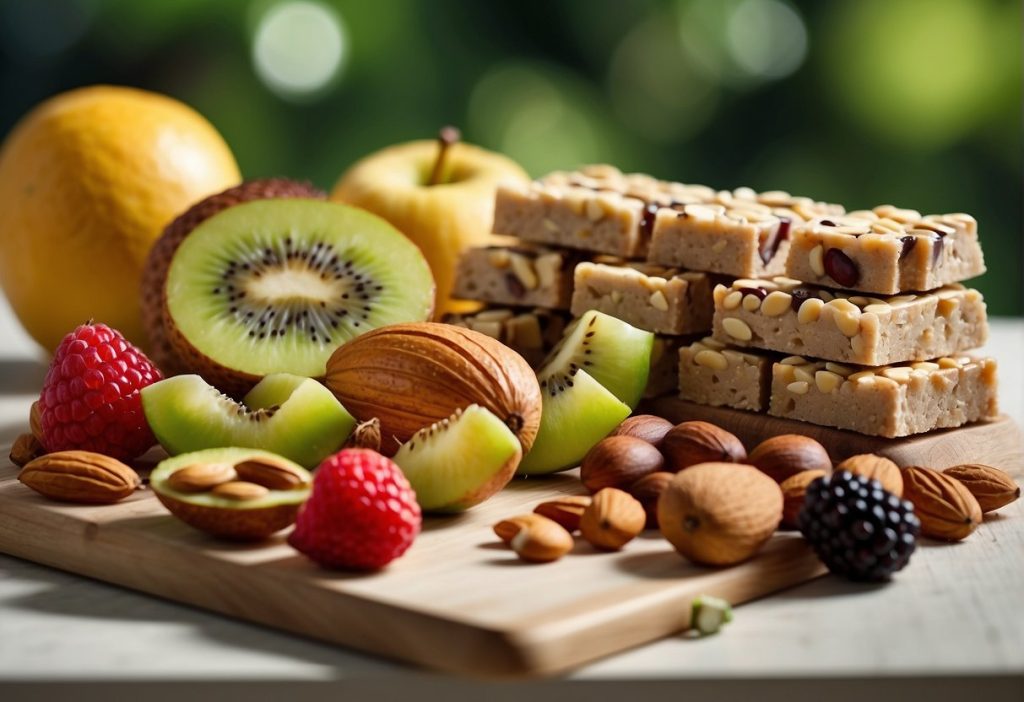
Selecting the right snacks is key to supporting your muscle gain goals. Your attention to incorporating protein-rich options plays a vital role in this pursuit. Snacks with a lot of essential amino acids can significantly help build muscle mass. Remember, it’s not just about the quantity of protein, but also the quality.
Adopting a healthy lifestyle involves more than periodic exercise. It includes making intentional food choices. Opting for snacks that align with a balanced healthy diet propels you towards your fitness goals. Below is a summarized checklist for reference:
- Optimal Nutrition: Choose snacks that offer a balance of protein, fats, and carbohydrates.
- Protein Quality: Prioritize snacks with complete proteins containing all essential amino acids.
- Frequency: Regularly consume small portions between meals to sustain energy and aid muscle repair.
- Hydration: Pair your snacks with adequate water intake to support metabolic processes.
By integrating these practices into your routine, you’re taking a decisive step. It will help cement a healthy lifestyle that complements your muscle gain objectives. Keep in mind that consistency is key, and pairing your dietary efforts with a robust exercise regime will yield the best results. Your journey to a stronger, healthier you is well underway with these smart snacking choices.
Healthy Snacks for Muscle Gain :Frequently Asked Questions
Q: What is the best healthy snack for muscle gain?
A: The best snack for muscle gain is one that provides a good balance of protein, healthy fats, and carbohydrates. Some great options include Greek yogurt with mixed berries, almond butter and banana sandwich, trail mix with nuts and dried fruits, cottage cheese with pineapple, and hummus with veggie sticks. These healthy snacks for muscle gain offer a combination of nutrients that support not only muscle growth, but muscle recovery as well.
Q: What are the evening healthy snacks for muscle gain?
A: For evening snacks that can support muscle gain, consider options that provide a good source of protein and healthy fats. Some ideas include a small serving of Greek yogurt with nuts. Alternatively, you could have a protein smoothie made with whey protein and almond milk. Another option is a slice of whole grain toast with avocado. Or, you could have a small portion of lean turkey or chicken with a side of vegetables. These snacks can help provide the nutrients needed for muscle recovery and growth during the evening hours.
Q: Can you eat snacks and gain muscle?
A: Yes, you can definitely eat snacks and still gain muscle. In fact, consuming the right snacks can be an important part of a muscle-building diet. Snacks high in protein, healthy fats, and carbohydrates can provide necessary nutrients. They support muscle growth and recovery. It’s important to choose snacks that are nutrient-dense and align with your overall dietary and fitness goals.
Q: Which snack has highest protein?
A: Snacks that are highest in protein include options such as Greek yogurt, cottage cheese, beef or turkey jerky, protein bars, and nuts and seeds. These snacks are excellent sources of protein and can support muscle gain when incorporated into a balanced diet.
Q: What are 5 muscle building foods?
A: Five muscle-building foods that are rich in essential nutrients include:
- Lean white meat such as chicken, turkey, and lean cuts of red meat are excellent sources of high-protein foods. Protein is essential for muscle repair and growth.
- Eggs are a complete protein source. They also contain important nutrients like choline and vitamin D, which are beneficial for muscle health.
- Greek yogurt is a high-protein food and often low in added sugars. It’s a great muscle-building food, and it provides beneficial probiotics.
- Quinoa is a whole grain that is rich in protein. It contains all nine essential amino acids. This makes it a valuable addition to a muscle-building diet.
- Salmon, a fatty fish, provides high-quality protein. It also has omega-3 fatty acids that can support muscle function and reduce inflammation.
Incorporating these foods into your diet can help support muscle growth and overall health.

